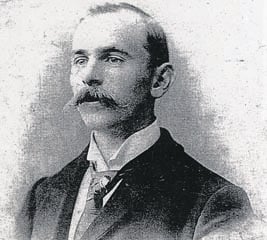As the county marks the centenary of the start of the First World War, Monmouth residents refect on those from the town who paid the ultimate sacrifice.
The story of one town hero has been immortalised in research by the former postman's grandchildren, as the date of what would have been his 139th birthday approaches.
Henry William Frances 'Frank' Collins was killed in Belgium on Christmas Day 1915.
The story of his life and death has been put together by grandchildren Michael Collins, Terry McGill and Caroline Woolley.
Frank Collins was born 1st March 1875 in Monmouth and attended Priory Street School. At the age of 16 he lied about his age and joined the army. Joining the East Yorkshires in 1891, he was appointed drummer and four years later made the rank of Corporal. Mr Collins became a reservist in 1898, living in Monmouth and working as a postman in the town.
He was recalled to service in 1899 and spent more than two years serving in South Africa in the Boer War. His slight frame made him perfect as a messenger, often putting him in a great deal of danger.
He had three horses shot from underneath him during the war. On the third occasion he was made a Queens Corporal and mentioned in Dispatches. Mr Collins received two King's medals for his time in South Africa.
In 1903 the Monmouth man returned home to his life as a postman in the town.
He married Frances Wood in at Thomas' Church that year, and the couple had three children: Reginald, Harry and Vera. They lived in Priory Cottage on Whitecross Street.
The grandchildren's research states: "as a local postman, Frank became a well-known character in Monmouth. He earned extra money by touring the local pubs to sing Irish songs, and could sometimes be spotted carrying a piglet under his arm".
At the outbreak of the First World War, Mr Collins had become a sergeant in the Territorial Army. He served with the 2nd Battalion Monmouthshire Regiment- part of the South Wales Borderers, and was called to the war in 1914.
He was never to return home to his family or cherished home town, as on 25th December that year, he was killed in the field.
An article written at the time stated: "On Tuesday afternoon Mrs Collins received the following communication from Colonel Cuthertson, who is in command of the 2nd Monmouths: "Dear Mrs Collins, I cannot tell you how deeply grieved I am to inform you that your gallant husband, Sergt F Collins, was killed in action this morning.
"He was shot through the chest and died without suffering any pain whatever at 10.45am. The Sergt Major and myself were with him when he died, he was quite unconscious at the time. This must be a terribly sad Christmastide for you."
There is no recorded confirmation that Mr Collins' death occurred under a truce. After his death he was mentioned again in Dispatches by Field Marshal Commander in Chief Sir John French, for: "gallant and distinguished service in the field".
A plaque mounted in St Mary's Church in Monmouth pays tribute to all Monmouth postmen killed in the war: 'John Davies, Alfred Davies, Fredrick Jones, John Llywarch and Horace Warren'.
Mr Collins' son Reginald joined the TA's 2nd Battalion Monmouthshire aged 18 and followed his father into the East Yorkshire Regiment.
The research conducted by Mr Collins' grandchildren brings to light the extraordinary story of a Monmouth hero who died 100 years ago.
Grandson Michael Collins said: "These brave men wore the Welsh Dragon as the cap badge. They were men of steel, fired with the Dragon's fire. They fell for our freedom.
"This is the record of Frank Collins, heard by me from my father Reg and from people who served with him. I have inherited his love of Celtic and Irish songs and his sense of humour, he served in South Africa, I in East Africa. I feel a strong bond with him."

Comments
This article has no comments yet. Be the first to leave a comment.